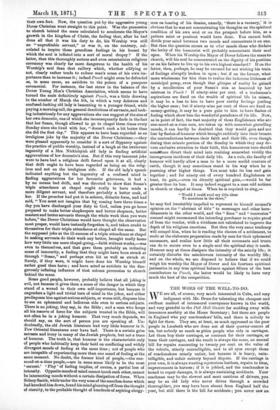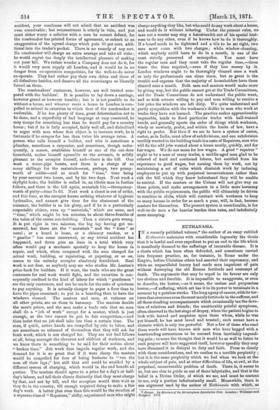THE WOES OF THE WELL-TO-DO.
WE are all, of course, very much interested in Cabs, and very indignant with Mr. Bruce for tolerating the cheapest and swiftest method of intramural conveyance known in the world, and very grateful to the Pall Mall Gazette for scolding away with innocuous acerbity at the Home Secretary ; but there are people in England who pay coachmakers' bills, and there is nobody te fight for them. They are, at least, as much oppressed as the poor people in Lambeth who are done out of their quarter-ounces of tea, but nobody so much as pities people who ride in carriages. Let them buy their carriages, or contract for their carriages, or lease their carriages, and the result is always the same, an annual bill for repairs amounting to twenty per cent. on the value of the vehicle, utterly unintelligible, and to all eyes except those of coachmakers utterly unfair, but because it is heavy, unin- telligible, and unfair entirely beyond dispute. If the carriage is your own, it is always wanting mysterious leathers, repairs to tires, improvements in harness ; if it is jobbed, and the coachmaker is bound to repair damages, it is always sustaining accidents. Your coachman may be the slowest and most cautious of drivers, you may be an old lady who never drives through a crowded thoroughfare, you may have been absent from England half the year, but still there is the bill for accidents ; you never saw an accident, your coachman will not admit that an accident was even conceivable ; but remonstrance is utterly in vain, and you must either worry a solicitor with a case he cannot defend, for the coachmaker has printed forms of agreement, or submit td an exaggeration of the agreed charge which puts 30 per cent, addi- tional into the trader's pocket. There is no remedy of any sort. No coachmaker will charge an extra average and take all risks ; he would regret too deeply the intellectual pleasure of making out your bill. We rather wonder a Company does not do it, for it would very soon supply all London, and it would be in no danger from co-operative competition, for the well-to-do never co-operate. They had rather pay their own debts and those of all defaulters besides, and deserve all the overcharges so liberally forced on them.
The coachmalers' customers, however, are well treated com- pared with the builders'. It is possible to lay down a carriage, however grand or however humble ; but it is not possible to do without a house, and whoever rents a house in London is com- pelled to submit to extortion to which that of the coachmaker is -endurable. If he has plenty of time, great determination not to be done, and a superfluity of bad language at easy command, he may escape for something less than he would pay for a country house ; but if he is fully occupied, fairly well off, and disinclined to argue with men whose first object is to increase work, he is fortunate if he escapes for less than twice his average rates. A person who calls himself a builder, and who is sometimes a plumber, sometimes a carpenter, and sometimes, though unfre- -quently, a mason, establishes himself as one of the out-door household, makes himself agreeable to the servants, is mildly pleasant to the occupier himself, and—there is the bill. One week a water-pipe bursts, and there is a charge of so many shillings for the materials—cost, perhaps, two penny- worth of solder—and so much for "time," time being by your account two hours, and by his two days. Next week a skylight leaks, the builder is called in, an idiotic man in fustian follows,, and there is the bill again, materials lls.—threepenny- worth of putty—time 7s 6d. Next week a closet is out of order, and this time, as the occupier knows nothing whatever of hygienic hydraulics, and cannot give time for the abatement of the nuisance, the builder is in his glory, and if he is a particularly respectable citizen, runs up "materials," which are none, and "time," which might be ten minutes, to about three-fourths of the value of the entire out-building. Then a cistern goes wrong. It is put right in two minutes, the big tap having got un- screwed, but there are the " materials " and the " time " as usual ; or a board is loose, or a chimney smokes, or a " gaselier " has come unscrewed, or any trivial accident has happened, and down goes an item in a total which very -often would pay a mechanic specially to keep the house in -repair, and which, when compared with the sum charged for actual work, building, or repainting, or papering, or so on, seems to the unlucky occupier absolutely fraudulent. Real work is not dear, as anybody may see who studies Mr. Laxton's price-book for builders. If it were, the trade who are the great customers for real work would fight, and the extortion is con- sequently confined to the kind of labour for which " gentlemen " are the only customers, and can be made for the sake of quietness to pay anything. It is actually cheaper to paper a floor than to have the pipes examined ; to put in a boarding than to have the windows cleaned. The masters and men, at variance on all other points, are on these in harmony. The masters double the men's prices, and the men make a trade rule that no man shall do a "job of work" except for a master, which is just enough, as the two cannot be put in fair competition,—and then insist that no job shall take less than a certain time. The men, if quick, active hands are compelled by rule to loiter, and are sometimes so ashamed of themselves that they will ask for fresh work, which is not charged for. They are not bad fellows at all, being amongst the cleverest and shiftiest of workmen, and we know there is something to be said for their notion about "broken time." Job work does impede regular work, and the demand for it is so great that if it were cheap the masters would be compelled for fear of losing business to "run the men off their legs ;" but still that evil could be avoided by a different system of charging, which would in the end benefit all parties. The masters should agree to a price for a day's or half- day's labour, and tell their clients distinctly that they must charge by that, and not by bill, and the occupiers would then wait as they do in the country, till enough required doing to make a fair day's work. A better plan even than this would be the creation of a separate class of "Repairers," shifty, experienced men who might
charge anything they like, but who could do any work about a house, and would do it without loitering. Under the present rules, no man not a master may step a hairsbreadth out of his special busi- ness to do any other, even if he knows how to do it thoroughly. If a board needs to be tightened and a tile to be set right, two men must come with two charges ; while window-cleaning, which anybody could learn to do in a month, is one of the most strictly preserved of monopolies. You must have the regular men and they must take the regular time,—three times the time required,—even if they lose money by it. London windows ought to be thoroughly cleaned once a week as only the professionals can clean them, but so great is the trouble and expense that the majority of householders have them cleaned once a month. Both_ men and masters would make more by giving way, but the public cannot get at the Trade Committees, and the Trade Committees do not understand the public want, and so with owners willing to pay and men willing to receive a fair price the windows are left dirty. We quite understand and partly sympathize with the workmen's dislike to men who work at trades they have not learned. The practice makes apprenticeship impossible, tends to flood particular trades with half-trained hands, and generally upsets the order of things which workmen, wisely or unwisely, prefer, and within the limits of law, have a right to prefer. But then if we are to have a system of castes, castes, as in India, must allow of subdivisions, and one subdivision terribly wanted in the building trade is a caste of Repairers, men who will do the odd jobs wanted Bloat a house neatly, quickly, and for fair wages. We do not mean for low wages. A good " repairer" ought to be a man of many trades, a middle-aged man glad to be relieved of hard and continued labour, but entitled from his experience to good wages, but earning them by work, not by maintaining a set of rules which diminish work by inducing employers to put up with perPetual inconveniences rather than risk the bill which they know beforehand they will be unable to control. If the masters or the Unions will not give way on these points, and make arrangements in a little more harmony with the public requirements, the public will ultimately be driven to combine in clubs, which will contract with workmen to keep so many houses in order for so much a year, will, in fact, become
masters for themselves. he present system is unendurable, is for well-to-do men a far heavier burden than rates, and indefinitely more annoying.



































 Previous page
Previous page